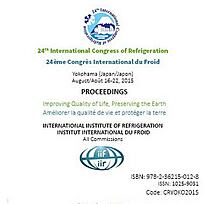
Document IIF
Technologies frigorifiques de prochaine génération au R744 pour les supermarchés.
Next generation R744 refrigeration technology for supermarkets.
Numéro : pap. n. 768
Auteurs : HAFNER A., FREDSLUND K, BANASIAK K.
Résumé
Supermarket refrigeration units of the future have to be able to handle the entire energy flows and demands in the supermarket building. Besides providing the cooling capacity for medium and low temperature display cabinets, the heat pumping demands of the HVAC units should be integrated into the requirement specification. This will reduce total investment and service costs. It will also reduce the total energy consumption due to the possibility of direct utilization of surplus heat and advanced capacity controls during AC mode. Therefore the system architecture of R744 commercial refrigeration unit has to be adapted to be able to fulfil the required duties as energy efficient as possible, i.a. the control of evaporation temperatures and evaporator outlet conditions at low, medium and AC temperature level. Integration of auxiliary evaporators for heat pump & AC operation will be discussed and control strategies to further improve the multi ejector enhanced parallel compression systems. Compared to HFC404A units, R744 ejector supported units with parallel compression and a pressure lift of around 15 bar do have the highest energy efficiency values and represent the next generation of R744 technology, which can be applied globally, significantly reducing both direct and indirect greenhouse gas emissions.
Documents disponibles
Format PDF
Pages : 20 p.
Disponible
Gratuit
Détails
- Titre original : Next generation R744 refrigeration technology for supermarkets.
- Identifiant de la fiche : 30015399
- Langues : Anglais
- Source : Proceedings of the 24th IIR International Congress of Refrigeration: Yokohama, Japan, August 16-22, 2015.
- Date d'édition : 16/08/2015
- DOI : http://dx.doi.org/10.18462/iir.icr.2015.0768
Liens
Voir d'autres communications du même compte rendu (657)
Voir le compte rendu de la conférence
Indexation
-
System efficiency and energy saving with parall...
- Auteurs : KRIEZI E. E., LARSEN L. F. S., PISCOPIELLO S., et al.
- Date : 18/06/2018
- Langues : Anglais
- Source : 13th IIR Gustav Lorentzen Conference on Natural Refrigerants (GL2018). Proceedings. Valencia, Spain, June 18-20th 2018.
- Formats : PDF
Voir la fiche
-
Experimental measurements on the effect of a mo...
- Auteurs : FERRARESE T., ZANCO A., DEL COL D.
- Date : 18/06/2018
- Langues : Anglais
- Source : 13th IIR Gustav Lorentzen Conference on Natural Refrigerants (GL2018). Proceedings. Valencia, Spain, June 18-20th 2018.
- Formats : PDF
Voir la fiche
-
Possible configurations of multiejector driven ...
- Auteurs : BLUST S., HAFNER A., BANASIAK K., et al.
- Date : 18/06/2018
- Langues : Anglais
- Source : 13th IIR Gustav Lorentzen Conference on Natural Refrigerants (GL2018). Proceedings. Valencia, Spain, June 18-20th 2018.
- Formats : PDF
Voir la fiche
-
Integrated R744 ejector supported parallel comp...
- Auteurs : PARDIÑAS A. A., HAFNER A., BANASIAK K.
- Date : 18/06/2018
- Langues : Anglais
- Source : 13th IIR Gustav Lorentzen Conference on Natural Refrigerants (GL2018). Proceedings. Valencia, Spain, June 18-20th 2018.
- Formats : PDF
Voir la fiche
-
Experience with ejectors implemented in a R744 ...
- Auteurs : SCHÖNENBERGER J., HAFNER A., BANASIAK K., et al.
- Date : 02/08/2014
- Langues : Anglais
- Source : 11th IIR Gustav Lorentzen Conference on Natural Refrigerants (GL2014). Proceedings. Hangzhou, China, August 31-September 2, 2014.
- Formats : PDF
Voir la fiche
